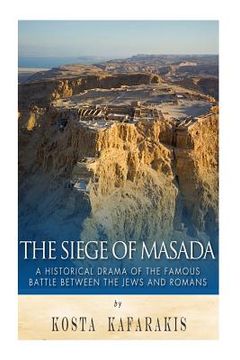The Siege of Masada: A Historical Drama of the Famous Battle Between the Jews and Romans (en Inglés)
Reseña del libro "The Siege of Masada: A Historical Drama of the Famous Battle Between the Jews and Romans (en Inglés)"
*Includes pictures of Masada and other important places and events *Includes a table of contents *Includes a bibliography of other books about Masada "Since we long ago resolved never to be servants to the Romans, nor to any other than to God Himself, Who alone is the true and just Lord of mankind, the time is now come that obliges us to make that resolution true in practice ... We were the very first that revolted, and we are the last to fight against them; and I cannot but esteem it as a favor that God has granted us, that it is still in our power to die bravely, and in a state of freedom." - Elazar ben Yair Many Westerners have never even heard of the Siege of Masada, and those who have may simply know it as an obscure reference to a minor battle fought in a remote location of the Roman world. By contrast, virtually all Israeli school children know the story of Masada as a premier example of nationalistic pride. According to historian Klara Palotai, "Masada became a symbol for a heroic 'last stand' for the State of Israel and played a major role for Israel in forging national identity" Indeed, the heroic story of a small band of fighters facing incalculable odds has many elements that are reminiscent of both the Battle of Thermopylae and the Battle of the Alamo. The refrain "Masada shall not fall again," coined in a poem on the subject by Yitzak Lamdan, became a cry of resolve in battle for Israeli soldiers in the 20th century, just as the cry of "Remember the Alamo" had galvanized Americans. For decades, the Israelite military used the site of Masada as the location for swearing in their new recruits, and the choice of the site was obviously designed to evoke within the new soldiers a deep sense of connection with their national history. The Siege of Masada was the final battle in a long series of fights that constituted the First Jewish-Roman War. The Roman Empire had established control over the region in the 1st century BCE, when the Roman proconsul Pompey the Great took control of Jerusalem and ceremonially defiled their temple by entering it. This mix of political control and religious desecration was a contentious issue for the Judeans throughout the Roman period, and militant activists opposed to Roman rule, often espousing strongly held religious beliefs, frequently developed large followings to challenge the Roman authorities. This led to multiple violent clashes between the Judeans and the Romans, and the First Jewish-Roman War (66-73 CE) was one such clash (albeit on a larger scale than most). The Roman troops marched through and made their military might felt, first in the northern region of Galilee, then down the coast where they finally laid siege to the capital city of Jerusalem. This left three Roman fortress outposts, including Masada, that had been built by Herod the Great but had been taken over by various Judean factions. Masada was the last of these fortresses that the Romans attacked and proved the most difficult for them to seize, but seize it they did. However, what made this battle qualitatively different from most was not just the difficulty Rome had in retaking control of it with incredibly disproportional military equipment and numbers, but also the actions of the Judean defenders. In the final hours of the battle, just as the Romans were about to breach the walls of the city, the defenders gathered together and committed mass suicide, rather than being killed or taken captive by the Romans. The Siege of Masada: A Historical Drama of the Famous Battle Between the Jews and Romans is a historical drama that portrays the famous battle from the standpoint of a fictional survivor.

